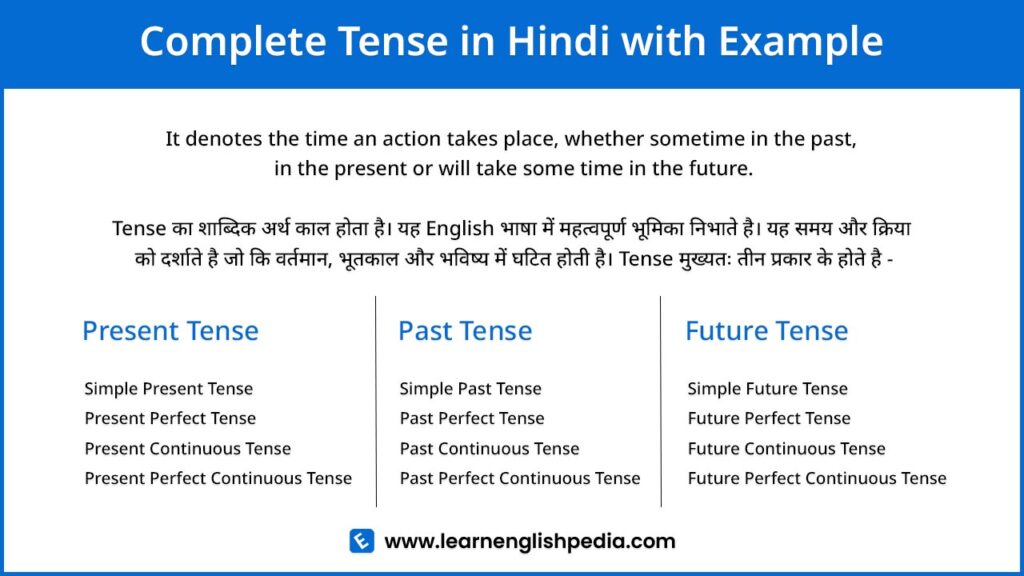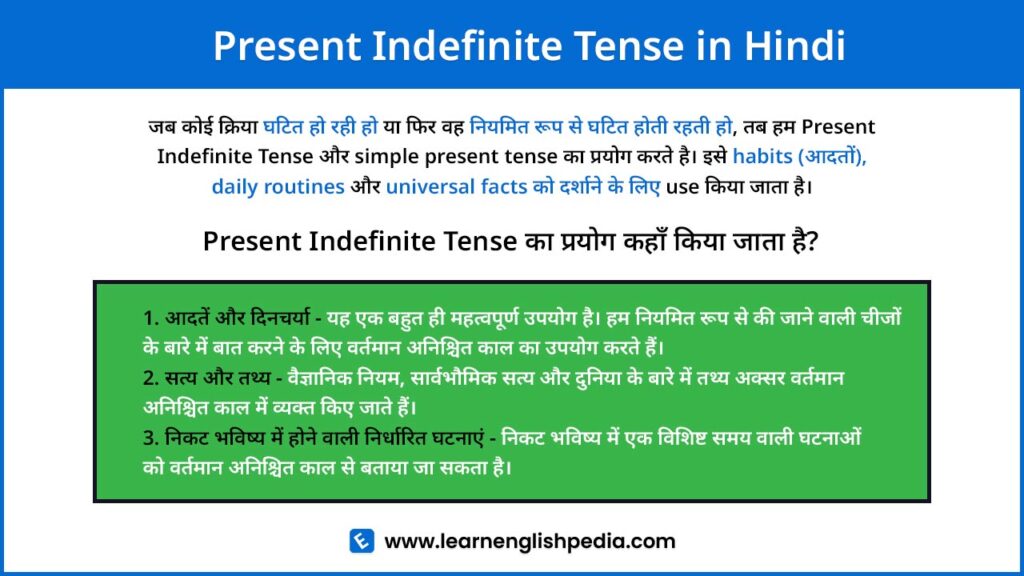इस article में हम Present perfect continuous tense in hindi के बारे में जानेंगे। हम जानेंगे कि present perfect continuous tense की पहचान क्या है, उसका structure क्या है और उसके उदाहरण क्या क्या है?
Present Perfect Continuous Tense in Hindi
Present perfect continuous tense का प्रयोग उस क्रिया को बताने के लिए किया जाता है जो भूतकाल में शुरू हुई थी और वर्तमान समय तक चल रही है। जिस वाक्य के अंत में से – रहा है, से – रही है, और से – रहे है आये, उसे present perfect continuous tense कहा जाता है, जैसे – वह 2 साल से स्कूल जा रहा है। (He has been going to school for 2 years.)
Main Uses of Present Perfect Continuous Tense in Hindi
Affirmative Forms –
Present perfect continuous के affirmative sentences में verb की 1st form के साथ ing का प्रयोग किया जाता है और has been का प्रयोग singular number third person (he, she, it, any name) के साथ और have been का प्रयोग I एवं second-person तथा plural subject के साथ किया जाता है।
Structure –
Subject + has/ have + been + (Verb I + ing) + Object + since/ for + ….
Example –
- I have been going to school since Monday. – मैं सोमवार से स्कूल जा रहा हूं।
- He has been going to school for three years. – वह तीन साल से स्कूल जा रहा है।
- She has been going to school since morning. – वह सुबह से स्कूल जा रही है।
- We have been going to school for a week. – हम एक हफ्ते के लिए स्कूल जा रहे हैं।
- You have been going to school since 9 O’clock. – आप 9 बजे से स्कूल जा रहे हैं।
- They have been going to school since January 2005. – वे जनवरी 2005 से स्कूल जा रहे हैं।
Note – ऐसे वाक्यों को दर्शाने के लिए for और since का प्रयोग किया जाता है। इसके बारे में गहराई से जानने के लिए आप prepositions के बारे में पढ़ सकते है।
Negative Forms –
Present perfect continuous tense के negative sentences में not का प्रयोग किया जाता है। Not का प्रयोग पहली helping verb has/have के बाद तथा been से पहले किया जाता है।
Structure –
Subject + has/ have + not + been + (Verb I + ing) + Object + since/ for + ….
Example –
| I have not been going to school since Monday. | मैं सोमवार से स्कूल नहीं जा रहा हूं। |
| He has not been going to school for three years. | वह तीन साल से स्कूल नहीं जा रहा है। |
| She has not been going to school since morning. | वह सुबह से स्कूल नहीं जा रही है। |
| We have not been going to school for a week. | हम एक हफ्ते से स्कूल नहीं जा रहे हैं। |
| You have not been going to school since 9 O’ clock. | आप 9 बजे के बाद से स्कूल नहीं जा रहे हैं |
| They have not been going to school since January 2005. | वे जनवरी 2005 से स्कूल नहीं जा रहे हैं। |
Interrogative Forms –
Present perfect continuous tense के interrogative sentences में has/have का प्रयोग subject के पहले किया जाता है।
Structure –
Has/ Have + Subject + been + (Verb I + ing) + Object + since/ for + …?
Example –
| Have I been going to school since Monday? | क्या मैं सोमवार से स्कूल जा रहा हूं? |
| Has he been going to school for three years? | क्या वह तीन साल से स्कूल जा रहा है? |
| Has she been going to school since morning? | क्या वह सुबह से स्कूल जा रही है? |
| Have we been going to school for a week? | क्या हम एक हफ्ते के लिए स्कूल जा रहे हैं? |
| Have you been going to school since 9 O’clock? | क्या आप 9 बजे से स्कूल जा रहे हैं? |
| Have they been going to school since January 2005? | क्या वे जनवरी 2005 से स्कूल जा रहे हैं? |
Interrogative Negative Forms –
Present perfect continuous tense के interrogative negative sentences में हम helping verb has/have का प्रयोग subject से पहले और subject के बाद में not और been का प्रयोग किया जाता है।
Structure –
Has/ Have + Subject + not + been + (Verb I + ing) + Object + since/ for + …?
Example –
| Have I not been going to school since Monday? | क्या मैं सोमवार से स्कूल नहीं जा रहा हूँ? |
| Has he not been going to school for three years? | क्या वह तीन साल से स्कूल नहीं जा रहा है? |
| Has she not been going to school since morning? | क्या वह सुबह से स्कूल नहीं जा रही है? |
| Have we not been going to school for a week? | क्या हम एक हफ्ते से स्कूल नहीं जा रहे हैं? |
| Have you not been going to school since 9 O’clock? | क्या आप 9 बजे से स्कूल नहीं जा रहे हैं? |
| Have they not been going to school since January 2005? | क्या वे जनवरी 2005 से स्कूल नहीं जा रहे हैं? |
Read More – 50 Sentences of Can in Hindi


